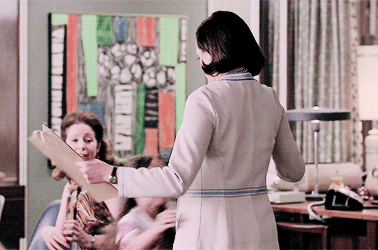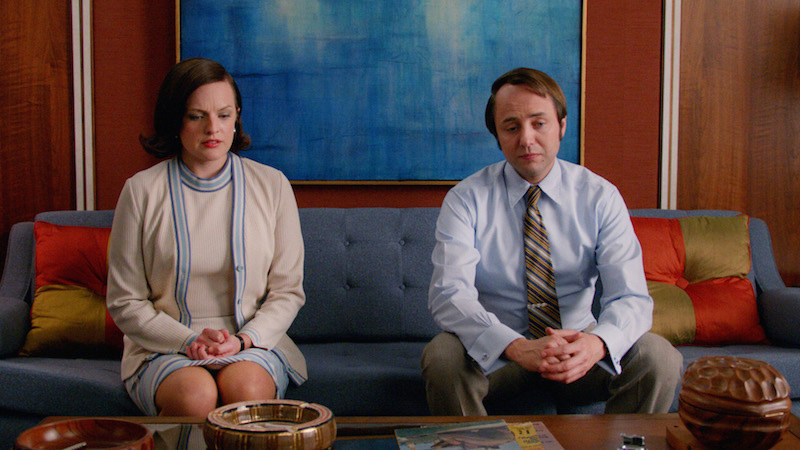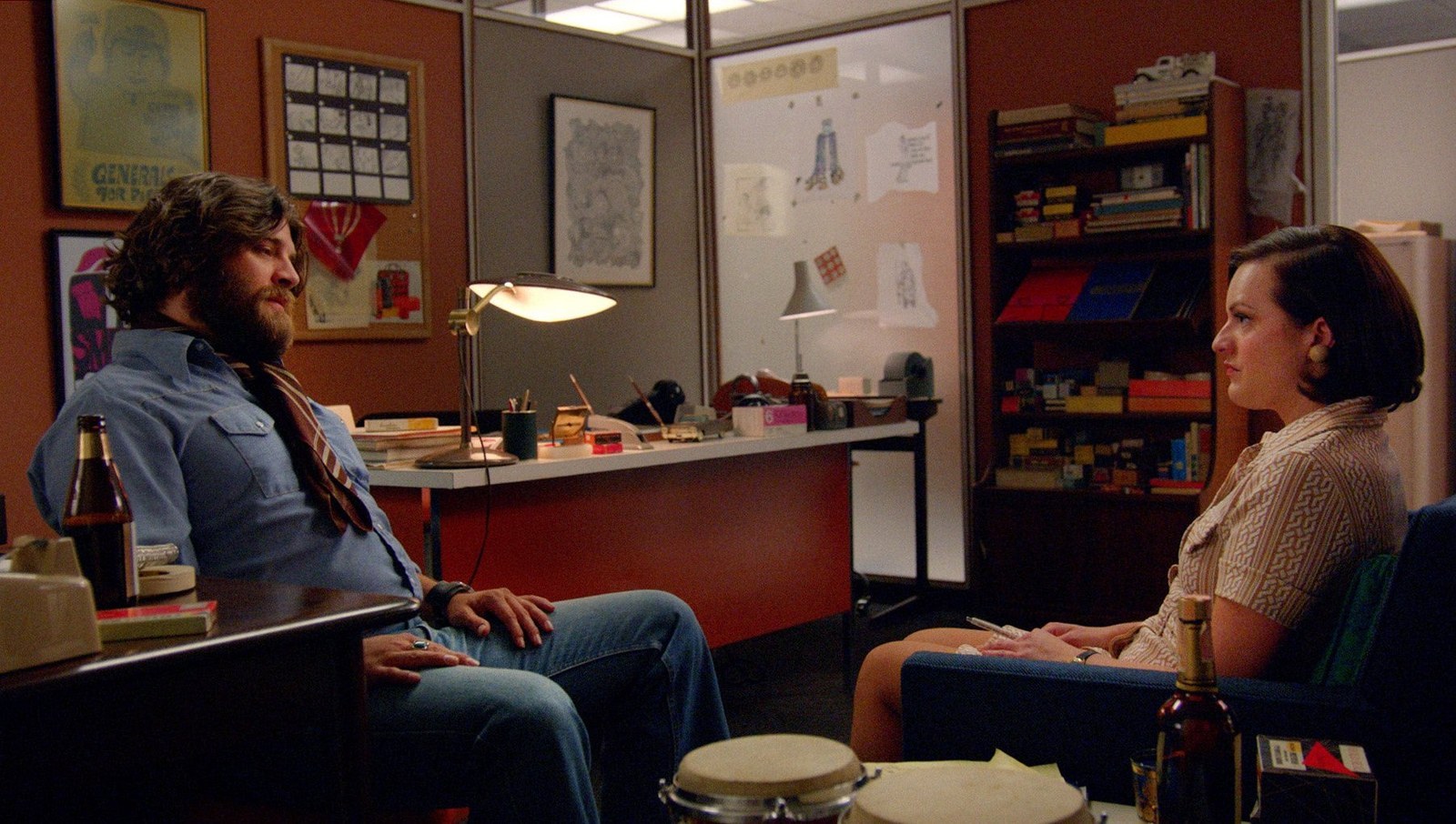
Peggy Olson has always been my heroine. Not because she’s clever or stylish or charming, but because she’s competent, focused, neurotic, and, above all, because she challenges everything the boys club of Mad Men represented. Through the last seven seasons, she’s a persistent reminder that it could all — whatever "all" might be — happen.
Despite the 40 years that separate our lives, Peggy and I are always more alike than not. She chose poor romantic and sexual partners and kept her nose to the grindstone; I was so frightened by the chaotic sexual politics and maneuvering of college that I eventually closed myself off to any pursuits, instead focusing on schoolwork, extracurriculars, career prospects, and bleary-eyed crushes on anyone who didn’t treat me like meat. The years went on, and as Peggy began to grapple with the intricacies of the agency, I found myself maneuvering multiple jobs, a busy course load, and a slew of other interests. She felt like she was being talked down to; I learned about intersectional feminism. She fell in lust with her boss and was then rejected; I made an innocent fool of myself over and over again with men.
As I headed into the final stretch of my “relationship” with Peggy, I thought I’d betrayed her: I met someone, which distanced me from Peggy’s sad-sack personal life. For half a season, I was able to watch her and not instinctively see every triumph or failure on her part as a reflection of my possible future self. When Ginsberg cut off his nipple and handed it to her, my first reaction wasn’t that this was a morbid forecast for my love life, but instead that oh god, why do the writers always give her the terrible male body interactions. When she, Don, and Pete bonded together over Burger Chef, the fluttering in my heart wasn’t from the hope that I would find such a community, but happiness that she was finally catching a break, however long it would last. Peggy Olson as pop culture doppelgänger was in my rearview mirror. Or so I thought.
Peggy is 21 years old when she gives up her baby boy for adoption. The pregnancy is a sudden revelation, unnoticed by her until the moment she goes into labor. When it’s over, Don, a man of many secrets himself, tells her, “It will shock you how much it never happened.”
Over the course of Mad Men’s decadelong internal clock, Peggy becomes an unwitting trailblazer — a feminist if not in name, then in direct action. She holds sexless power in a field dominated by men who still don’t see women as equals, and tackles subtle and overt sexism head on. She believes in her work, and holds everybody, especially herself, to a standard of integrity, honesty, and practicality. Everybody — from her priest to the mentor who first heralded her talent — lets her down, and it’s played as both hilarious and sad. The same applies to her interactions with children.
Peggy’s baby is a footnote until it isn’t, and the façade splinters. In the episode “Time & Life,” she demonstrated that behind her girlboss assurance and attitude, Peggy hasn’t forgotten that in order achieve what she has, she had to leave not just something, but someone, behind. For someone so dedicated to sincerity and who judges others so harshly for their contradictions, the realization that she still cares — about her baby, about caring about her baby — is the deepest contradiction of all.


I was two months away from 22 years old when I learned I was pregnant. I realized it, ironically enough, after going to a screening of Jenny Slate’s abortion comedy Obvious Child; the scenes where she talked about her breasts hurting resonated too sharply with me. An initial pregnancy test came back negative, but the hurt became more and more urgent; soon I was sitting on the toilet in our 10-person house, holding the little blue plus in my trembling hands.
I didn’t cry a lot in the beginning. I’d just started my first job out of college, working as a publicity assistant for a local Los Angeles business, and I had the support and commitment of my friends and my partner. When he and I walked to Planned Parenthood together so I could do the “formal” test, our hands were fused together, fingers wrapping around knuckles to clutch at the bones. I put off making an appointment because I didn’t want to miss work.
A couple of weeks later, I went to the bathroom after a shift and threw up what seemed to be the complete guts of my body. This went on for a day, and then the day became days. During this time, I couldn’t hold myself up for a shower, let alone put on makeup and strap myself into business casual, and I knew my co-workers were processing all of it — the weakness, the dishevelment, the visible shame. I couldn’t drink water or hold down any food; I could feel my cheeks thinning, and at my worst, I'd be throwing up the snot I’d ingested during all of my bouts of crying. I scheduled an appointment for as early as possible, and within the week, it was done. We split the full brunt of the cost evenly.
I think about this moment a lot. Not in a way of regret: I couldn’t have safely and lovingly raised a child, and I made my decision firmly and very early on. But there’s one thing that hasn’t left me and that I suspect never will. One of my nurses asked if I’d like to see the ultrasound. I told her no, and she obeyed my wish, except when she mentioned offhandedly that “it was only the size of a grain of rice.”
She wasn’t supposed to tell me anything; she wasn’t supposed to say anything real. Once the physical relief passed, my internal mourning began, and it continues on: even in my happiest moments since, even when I feel like I’m failing and falling for other reasons. Even as I reassure myself, Maybe you did what you thought was the best thing.

Peggy’s deep sense of guilt for having “paid the price” and “dodged a bullet” doesn’t imbue her with empathy. Instead, it metaphorizes into judgement. When she unleashes her fury onto a mother who left her child in the office, only to have her “motherly” concern flung in her face — only then does Peggy finally engage the part of her that isn’t missing, but whose absence is felt.
Peggy wants fortune, fame, and, yes, family, but the order of achievements eludes her. The number of times she’s mentioned having her own family in the show can be counted on one hand, but it’s only in her interaction with Stan that she faces the full scope of her feelings on the subject:
“I'm...I'm here. And... He's with a family somewhere. I don't know, but it's not because I don't care.”

For Peggy, the issue is as much that it happened as that she knows that she did the right thing for her. The trauma is double: that you did something you swore never to do, and yet when the time came, you knew exactly what you had to do. The lack of hesitation is both liberating and startling, but it acknowledges the autonomy of the person making the choice.
That’s what matters: You did what you had to do and you’re happy and you moved on — for you. That is fulfillment, that is the prioritization of the self, that is the thought you summon when you hear children laughing and your stomach sinks into a familiar nausea. Or, when your friend or co-worker or a stranger on the street thoughtlessly places her hand on her belly, you wait for the phantom kick, and it doesn’t come, and you learn that at least in this way, at this time, it’ll never come.
But even after you’ve steeled yourself against regret and its downward spiraling cousins, something still builds, swells, and every once in a while, breaks unbidden, surprises you like a sudden footfall in the dark. It passes, and the fear subsides, and it’s as if it never happened. As Peggy herself puts it: “I don't know because you're not supposed to know. Or you can't go on with your life.” But that doesn’t mean I don’t engage with it, even a year later, even a decade later.
I’ve moved on, but I still struggle with my decision, and in some ways, that’s the point. And in some ways, I know it isn’t. And in the way that matters most, I will never know the difference.
